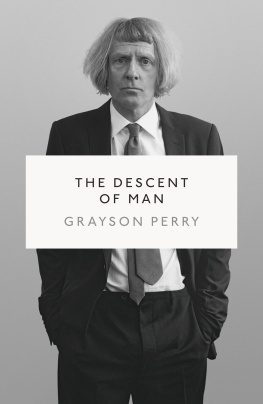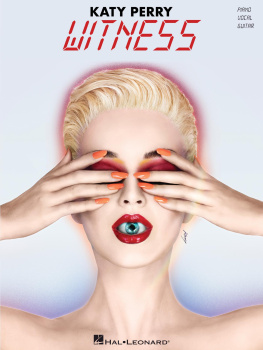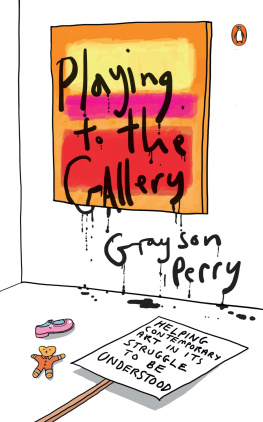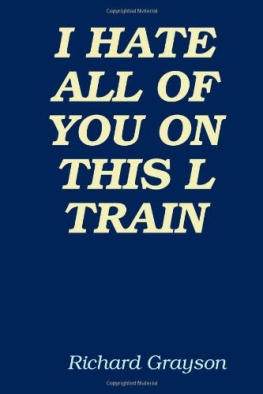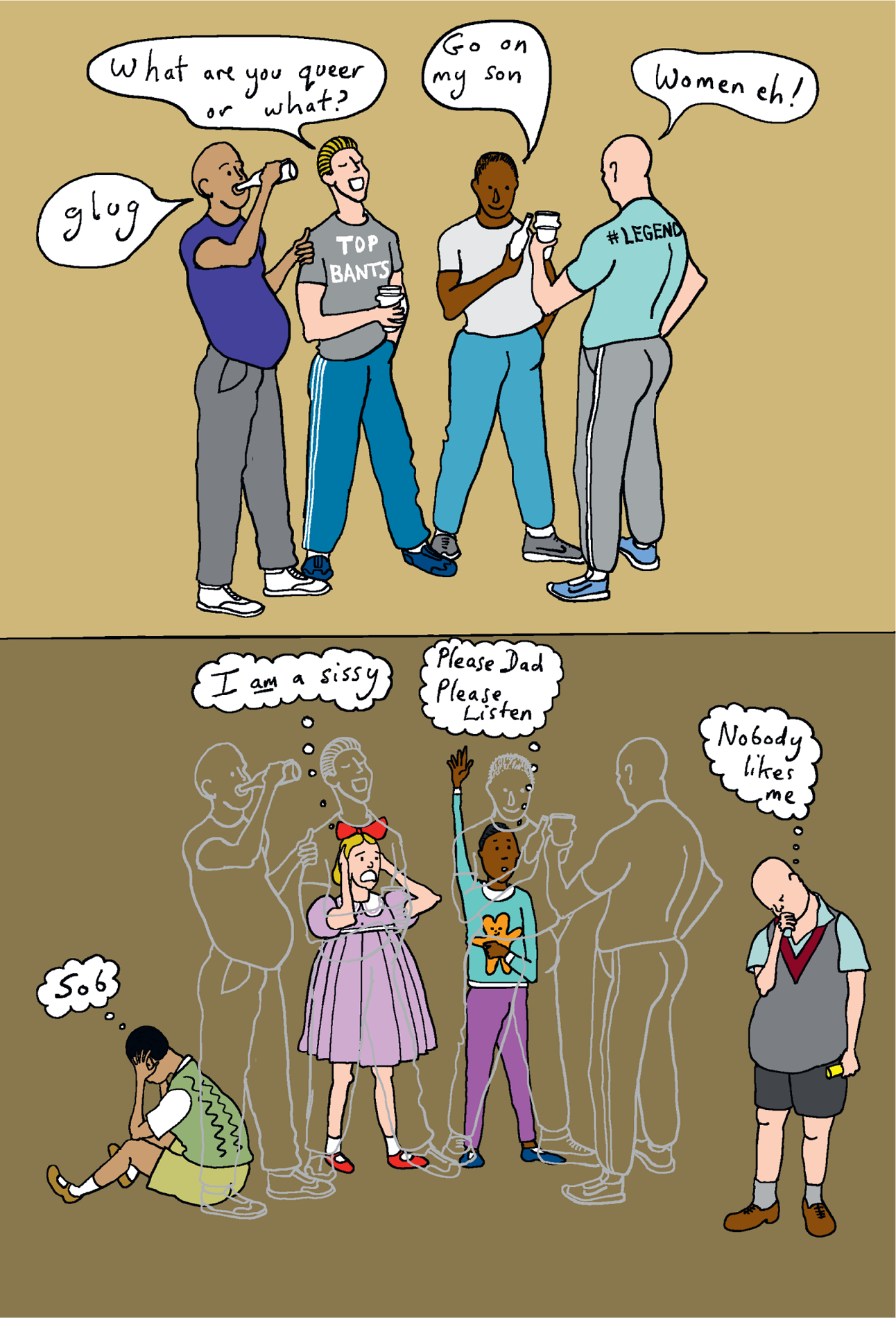Grayson Perry
THE DESCENT OF MAN
ALLEN LANE
UK | USA | Canada | Ireland | Australia
India | New Zealand | South Africa
Allen Lane is part of the Penguin Random House group of companies whose addresses can be found at global.penguinrandomhouse.com.
First published 2016
Text and images copyright Grayson Perry, 2016
The moral right of the author has been asserted
Cover photograph Axel Hoedt.
Cover design: Tom Etherington
ISBN: 978-0-141-98173-4
Dedicated to Alan Measles and all his fellows inside every man.
The truth will set you free. But first it will piss you off
Gloria Steinem
If It Aint Broke, Dont Fix It
I am riding my mountain bike through the forest up a long steep track. Halfway up I see a young boy, maybe nine or ten years old. He is struggling; this track is a tough challenge for anyone not used to mountain biking, let alone a kid on a new bicycle. He cant work the gears, and wobbles and grinds to a halt. Tears run down his face. Dad, Dad! he yells, sobbing. He is crying for help, but he is also in a boiling rage. I offer to help him, but he is so angry, so ashamed, that he doesnt acknowledge me. As I pedal past up the hill, I see the father in the distance. He is standing silently next to his mountain bike, arms folded across his chest, staring at his son two hundred metres down the hill. He also looks angry. I have seen that fathers face on a thousand football touchlines, outside a thousand school gates. Its a face that says, Toughen up, dont whine, be a man! Its the face of someone who hands down the rage and pain of what it is to be a man. I feel incensed on the boys behalf. I cant help myself: I say to the father, I hope your son can afford a good psychotherapist when he grows up. The father doesnt respond.
I hope that in picking up this book you have already acknowledged that masculinity needs to be questioned, that gender inequality is a huge issue for all of us and that the world would be a better place without it. What I hope this small book might do is bring awareness of masculinity to more people awareness being a step towards change, because many forms of masculinity can be very destructive. If this is the first book you have bought about gender, I am joyful. We need to examine masculinity, not just to prevent small boys from crying with rage at their impassive fathers on a mountain-bike ride, but to change the whole world for the better.
Examining masculinity can seem like a luxury problem, a pastime for a wealthy, well-educated, peaceful society, but I would argue the opposite: the poorer, the more undeveloped, the more uneducated a society is, the more masculinity needs realigning with the modern world, because masculinity is probably holding back that society. All over the globe, crimes are committed, wars are started, women are being held back, and economies are disastrously distorted by men, because of their outdated version of masculinity.
We need to get a philosophical fingernail under the edge of the firmly stuck-down masculinity sticker, so we can get hold of it and rip it off. Beneath the sticker, men are naked and vulnerable human even. It is a newsroom clich that masculinity is always somehow in crisis, under threat from pollutants such as shifting gender roles, but to me many aspects of masculinity seem such a blight on society that to say it is in crisis is like saying racism was in crisis in civil-rights-era America. Masculinity needs to change. Some may question this, but they are often white middle-class men with nice jobs and nice families: the current state of masculinity is biased in their favour. What about all the teenagers who think the only manly way out of poverty and dysfunction is to become a criminal? What about all the lonely men who cant get a partner, have trouble making friends and end up killing themselves? What about all the angry men who inflict their masculine baggage on the rest of us? All of us males need to look at ourselves with a clear eye and ask what sort of men would make the world a better place, for everyone.
When we think about masculinity and men, the issues can quickly become scarily global and serious. A discussion about hipster fashions or who does the washing-up can rapidly spiral into a debate about rape, war, terrorism, religious oppression and predatory capitalism. I sometimes watch the evening news on television and think all the worlds problems can be boiled down to one thing: the behaviour of people with a Y chromosome. Men seem to be the ones with the power, the money, the guns and the criminal records. The consequences of rogue masculinity are, I think, one of the biggest issues, if not the biggest issue, facing the world today. Some forms of masculinity particularly if starkly brutal or covertly domineering are toxic to an equal, free and tolerant society.
Understandably, women have led the discussion about gender. They are the ones who have been most oppressed by its constraints, after all. On the subject of gender, the feelings of many men can be summed up as if it aint broke, dont fix it; the status quo seems to work for them. But I am asking, Does it? Really? What if half the victims of masculinity are men? Masculinity might be a straitjacket that is keeping men from being themselves, whatever that might mean. In their drive for domination, men may have neglected to prioritize vital aspects of being wholly human, particularly issues around mental health. In their drive to be successfully masculine, men may be preventing their greater self from being successfully happy. I want to unpack what the American feminist Peggy McIntosh calls the invisible weightless knapsack of male privilege, full of special provisions, maps, passports, codebooks, visas, clothes, tools, and blank checks, to see if it is as much a burden to some men as a boon.
I feel I need to say here that in no way am I setting myself against men in general, not least because I am one. Nor am I against all masculinity: I can be as masculine as the next guy. This book is about what I think masculinity is, and questioning whether masculinity is working for us, making us happy. One of the problems when talking about masculinity is the confusion between sex (male) and gender (man). The physical, definite, pretty much unchanging fact of the male body can make us think that all the behaviours, feelings and culture associated with that body (masculinity) are also immutably writ in flesh. For many males, being masculine, acting in a manly way, is as unquestionably a biological part of them as their penis and testicles and deep voice. But masculinity is mainly a set of habits, traditions and beliefs historically associated with being a man. Our bodies take tens of millennia to evolve even slightly, but behaviours seen as masculine can be as transient as a teenage fad, a coalmine or a forgotten deity. We need to shift away from seeing masculinity as a closed set of behaviours and from seeing change as threatening, unnatural and feminizing. I see masculinity as being how men behave at present. I think it needs to change to include behaviours that are at present regarded by many as feminine, behaviours that are sensible, life-enhancing and planet-saving.

